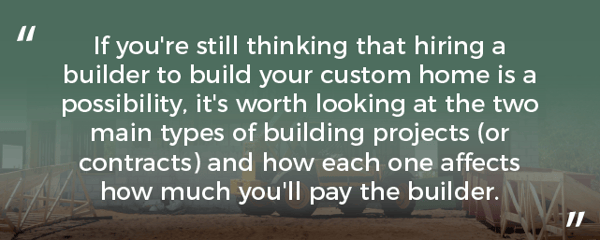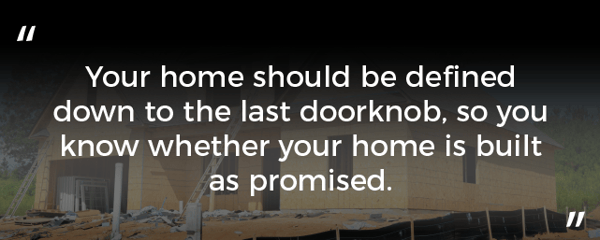ou want to get the most for your money when building a house. You know the builder will make a profit. The question is, how much does the builder make? I'll give you a little peek behind that curtain...
The short answer: 10-20% of the total price you pay. A good builder will earn his profit (on a $250,000, figure $25,000 - $50,000), by saving you more money— in reduced waste, time, and aggravation— than you will pay him in profit. Additionally, you're getting the builder's expertise in land selection and preparation, house plan design, financing, and any other area related to building a home on your land.
Maybe you're thinking, “I can do all that stuff a builder does myself,” reducing the cost to build a house. And it makes sense, in theory. But consider this: On the first day you arrived at your current job, did you know what to do without making a mistake? Could your boss replace you with someone off the street, pay them half the money (or pay them nothing), and get the same results?
Notice above where I said a good builder will earn his profit... I said "good". Not all builders are created equal.
What Costs Should You Expect When You Build a House?
There are many factors that go into the cost to build a house, including labor, materials, the builder's overhead and profit, and waste. You need the labor and materials. You DON'T want the waste, even though some is unavoidable. Do you need to pay a builder for his overhead and profit? It depends on whether you respect a particular builder's abilities and expertise.
You might be thinking, “Holy cow, I'm going to pay a builder somewhere near $30,000 just to make some phone calls and set up a schedule? No way! I can do that myself.” Maybe you can, but if you believe that, you'd have to believe that anyone could enter YOUR workplace and do it as well as you do without any prior experience.
You’ve Got to Have a Plan
Of course, there's a lot more to it that just some phones calls and setting up a schedule. There's all the planning (like where is the heat and air system going to go with all these rafter braces in the way?), material specifying (should that ceiling be 2x6s, 2x8s, or what?), estimating, ordering, purchasing, making sure all the materials get delivered correctly, making sure the contractors do their work according to code, etc…
I know there's a lot of distrust built up against custom home builders (much of it warranted), but it's unlikely that someone with no building experience will be able to build a house smoothly without expensive mistakes. In one stroke of a pen, you can make an $8,000 mistake like approving the wrong cabinet material.
You have to decide whether among the builders available to you, there's one who can save you more in money, time, and wasted energy than he makes in profit. After all, that's your value to your employer too - you have to add more to the bottom line than your boss pays you, or else why are you on the payroll?
If you're still thinking that hiring a builder to build your custom home is a possibility, it's worth looking at the two main types of building projects (or contracts) and how each one affects how much you'll pay the builder.

The Cost-Plus Building Contract
"Cost-plus" building means that you pay the actual cost of the construction, plus a fee (usually a percentage of the cost) to the builder as his fee. The great thing about this arrangement is that you, the customer, know EXACTLY how much money you're paying the builder, and how much money is going to pay for material and labor. The fee is widely variable, but based on what my fellow builders charge (the ones I trust to tell me the truth), it's typically 15-20%.
In this case, you have total freedom before and during the build to change anything you want, at any time. As long as you can afford the expense of making the changes, there's nothing to stop you, since you've agreed to pay the cost of construction, whatever it is. The builder doesn't mind, because he's just managing the work and you're paying the bills, and he doesn't have to worry if he's priced a change high enough to make a reasonable profit (and not lose money).
The downside is that the cost of mistakes, omissions, and lack of planning are on you. You're responsible for material overages, increase in material and labor prices, and whatever other expensive mistakes crop up during your home build. You also pay the builder's fee on top of that, and the fee actually goes up when there are more expensive mistakes in the home build.
Assuming all things are equal, and you can do all the planning, specifying of materials, budgeting, supervising, and negotiating with the same expertise as a builder who has built dozens, or hundreds, of homes, then building your own house will save you that 10-15%.
The Fixed-Price Contract
The other main type of home building contract is "fixed-price," which means that the builder plans out every detail of your home ahead of time, tells you how much it is, and is responsible for the cost of mistakes.
There is profit in the fixed-price contract, of course, or else the builder wouldn't still be in business. There's a wider range in the fixed-price contract simply because the builder absorbs all the variation from the original estimate. It's in the range of 10-25%, according to numbers from the National Association of Homebuilders (NAHB). Since the profit margin decreases any time there are expensive mistakes, the builder is more motivated than you are to keep those mistakes to a minimum.
Doesn't that tempt the fixed-price builder to cut corners if there's a problem? Possibly, and that becomes easy to do if you don't have an extremely detailed list of specifications he agreed to follow. Your home should be defined down to the last doorknob, so you know whether your home is built as promised.
The good fixed-price builder has control processes in place, developed over the course of many years of building homes, which is why he has the confidence to give you a fixed price. He knows what he can do and what he can't do. The bad one is winging it anyway, with no idea how much he'll make until it's done. His original price was a guess, so he doesn't have anything to compare the final number to.
The good fixed-price builder can build your home for less money, even with his profit, than you could yourself, because of the systems and techniques he's refined over the years. And the close relationships he has with suppliers and contractors can also help you keep costs down. The bad one can't, but you don't want him anyway.
Now you know how much a builder makes. The good ones earn it, and unlike your savings account, you will actually make a return on that investment.
Learn more...
Learn more about the process of going From Raw Land to Forever Home by reading our free guide. You can download it by clicking the button below:

